Summit Overview:
On May 9, 2025, SankalpTaru Foundation marked a milestone in its environmental journey with the launch of its first-ever annual Corporate Partners Summit—ST_Next 2025, held at India Habitat Centre, New Delhi. The summit brought together changemakers, corporate leaders, grassroots champions, and environmental experts who have stood at the forefront of action-oriented sustainability.
This day-long engagement was more than an event—it was a bold call to shift from promises to measurable progress, from trees to thriving ecosystems, and from fragmented efforts to unified impact. It also aimed to facilitate and empower corporate champions to take center stage in driving large-scale, long-term environmental transformation.
A Powerful Opening: Wisdom from Padma Shri Jadav “Molai” Payeng, the Forest Man of India
Speaker: Padma Shri Jadav “Molai” Payeng
Speech Summary:
The summit commenced with an inspiring keynote by Padma Shri Jadav “Molai” Payeng, globally celebrated as the Forest Man of India. Recounting his journey of single-handedly transforming a barren sandbar in Assam’s Brahmaputra River into the 550-hectare Molai Forest, Mr. Payeng’s address was more than a success story—it was a spiritual and ecological manifesto.
Through quiet persistence and a deep reverence for nature, Mr. Payeng transformed that wasteland into a vibrant ecosystem teeming with wildlife—including elephants, Bengal tigers, rhinoceroses, deer, and over a hundred species of birds. What makes this forest even more remarkable is that it was created entirely by one man, planting one tree at a time.
Today, the Molai Forest stands not just as a green sanctuary, but as a living classroom for researchers, botanists, and field ecologists. It demonstrates what long-term commitment to conservation can truly achieve.
Mr. Payeng used this powerful story to draw attention to the larger issue of environmental education. He highlighted a significant disconnect—students may study environmental science in classrooms, yet many cannot recognize the plants in their own surroundings. He emphasized integrating experiential environmental education at the primary school level, warning that without it, students may learn theory without forming a real-world connection to nature. Early exposure, he noted, is key to developing a lasting respect for the environment and a sense of personal responsibility.
Among all the reflections shared, the line “Planting a tree is just the beginning—it’s the nurturing that creates life.” stood out the most. His closing words, “Nature is God, God is Nature,” echoed across the audience, offering a profound philosophical anchor for the summit.
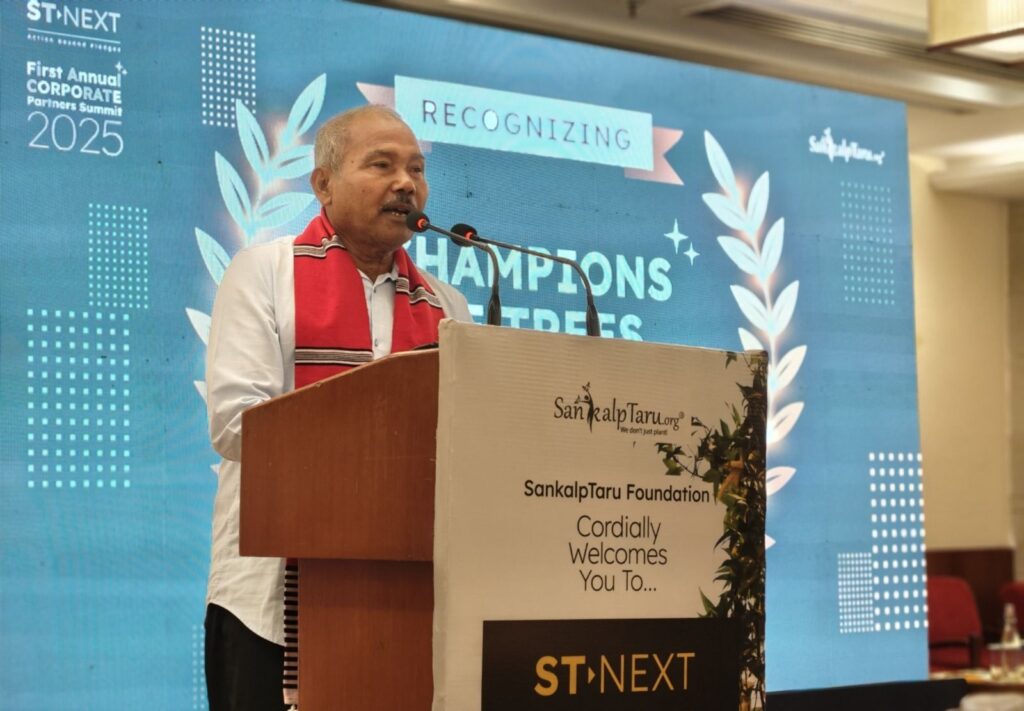
Panel Discussion 1: EcoWomen Leaders – Cultivating Change from the Roots
Speakers:
- Poonam Devi (Woman Farmer, Rohtak)
- Ms. Puja Bedi (AVP Marketing, Mamaearth)
- Ms. Pragya (Climate Justice Advocate)
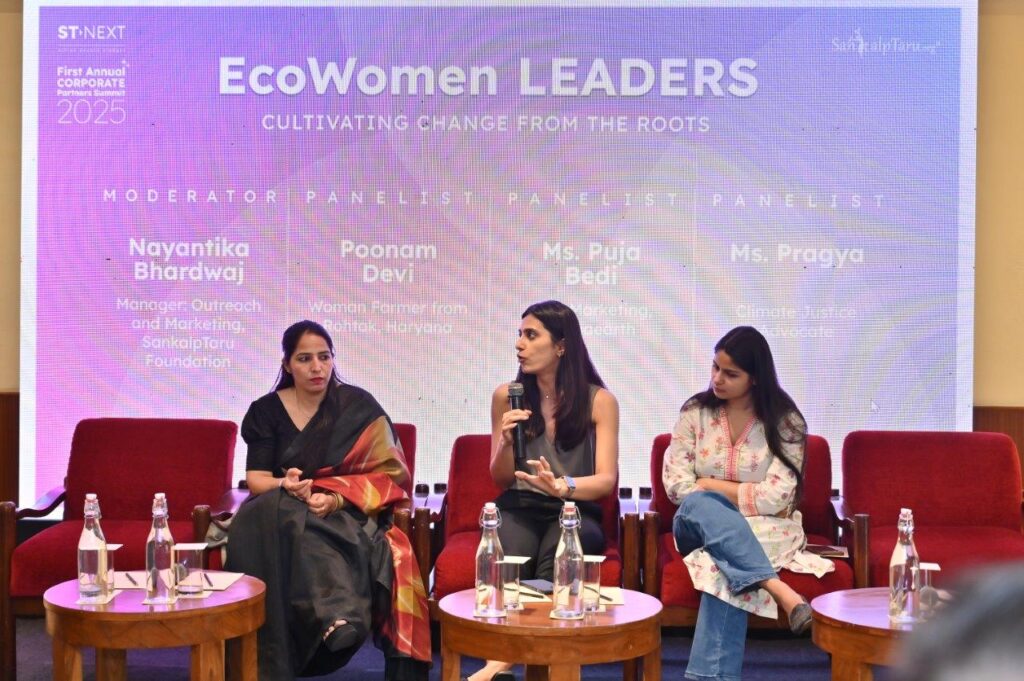
Panel Reflections: This compelling panel discussion brought together voices from grassroots farming, sustainable businesses, and youth-led climate advocacy. The meeting emphasized the power of women-led climate and sustainability initiatives – from grassroots farming to executive boardrooms to youth forums. A recurring theme was the importance of support systems, whether through NGOs like SankalpTaru, corporate partnerships, or mentorship networks. Each speaker reinforced that inclusive leadership and collaboration are the keys to driving meaningful and lasting change
- Poonam Devi (Woman Farmer, Rohtak) – Key Discussion Points:
Ms. Poonam Devi shared the initial challenges encountered, including societal skepticism, limited access to resources, and lack of confidence in women-led ventures. She spoke about the lack of awareness around sustainable techniques and financial constraints in the early days of her work.
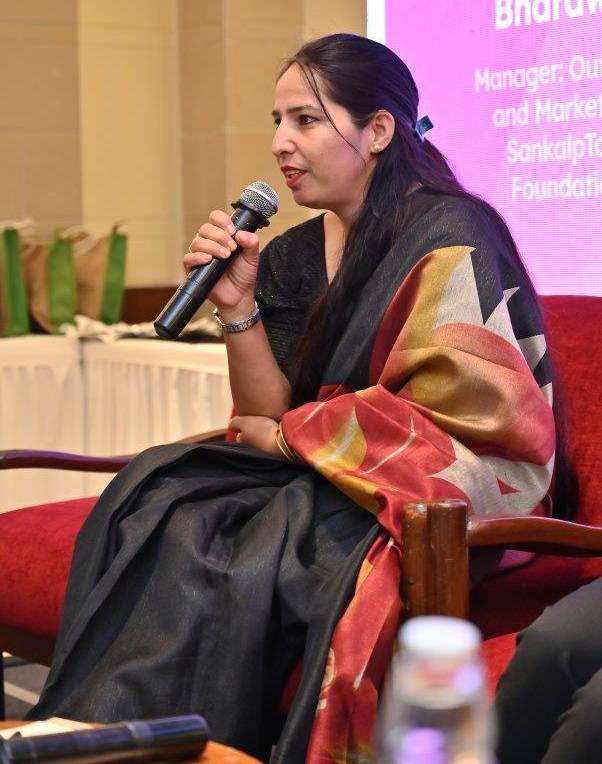
Her journey into organic farming and adoption of alley cropping techniques marked a turning point. With the support and motivation from SankalpTaru, she transformed her land into a green, productive space. Her achievements have served as a catalyst for inspiring local women, contributing to the emergence of sustainable livelihood initiatives within the community. Her story emphasizes that with the right support, rural women can be changemakers in agriculture and sustainability, highlighting the transformative potential of rural women when empowered with the right support.
Key Takeaways:
Organizational support and mentorship can help overcome gender-based and infrastructural barriers.
Women farmers are natural stewards of the environment and can scale green practices if given a chance.
Peer inspiration and local role models are critical to encouraging broader community participation.
- Ms. Puja Bedi (AVP Marketing, Mamaearth) – Key Discussion Points:
Puja Bedi emphasized that “sustainability should be at the heart of our everyday actions.” She discussed how MamaEarth integrates eco-conscious decisions into its branding, sourcing, and packaging, making sustainability accessible and attractive to modern consumers. A key highlight was the impactful partnership between MamaEarth and SankalpTaru, which not only supports afforestation but resonates deeply with consumers, generating appreciation and loyalty.
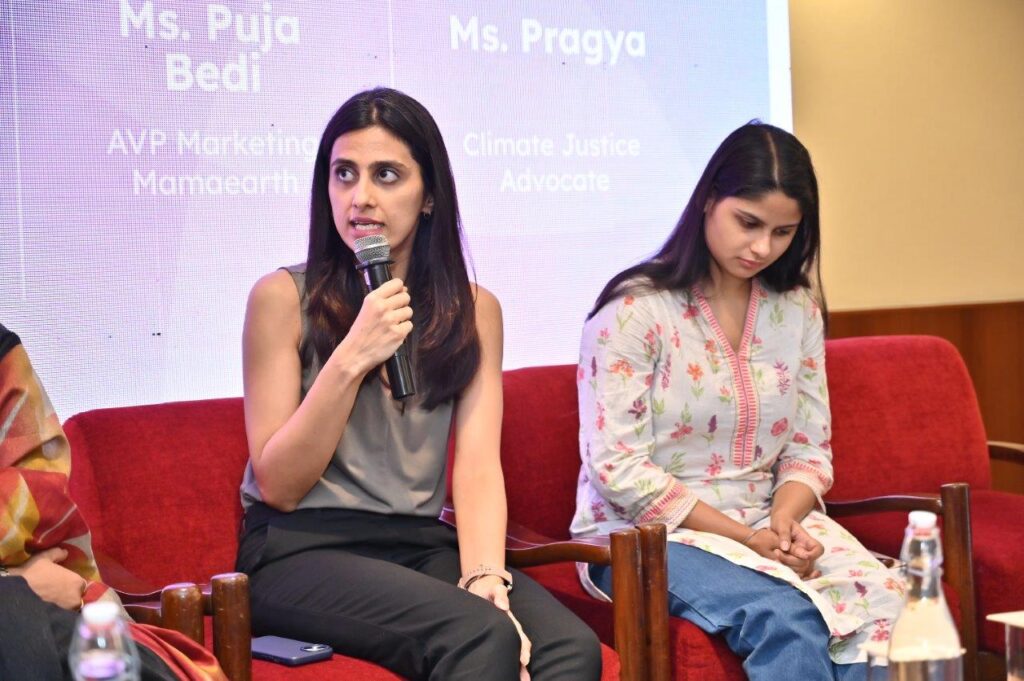
She reflected on how women executives bring a holistic, empathetic approach to sustainability branding. Women in leadership roles often prioritize long-term value and community impact, setting a tone that inspires trust and credibility in eco-friendly business models.
Key Takeaways:
Sustainability can be successfully woven into business models through thoughtful branding and partnerships.
Consumers are increasingly valuing authenticity, transparency, and purpose in their product choices.
Women leaders play a pivotal role in embedding ethical practices within business culture.
- Ms. Pragya (Youth Climate Justice Advocate) – Key Discussion Points:
Pragya outlined how young people today are demanding bold, innovative, and inclusive climate policies. They are not just raising concerns but are ready with actionable ideas and local solutions.
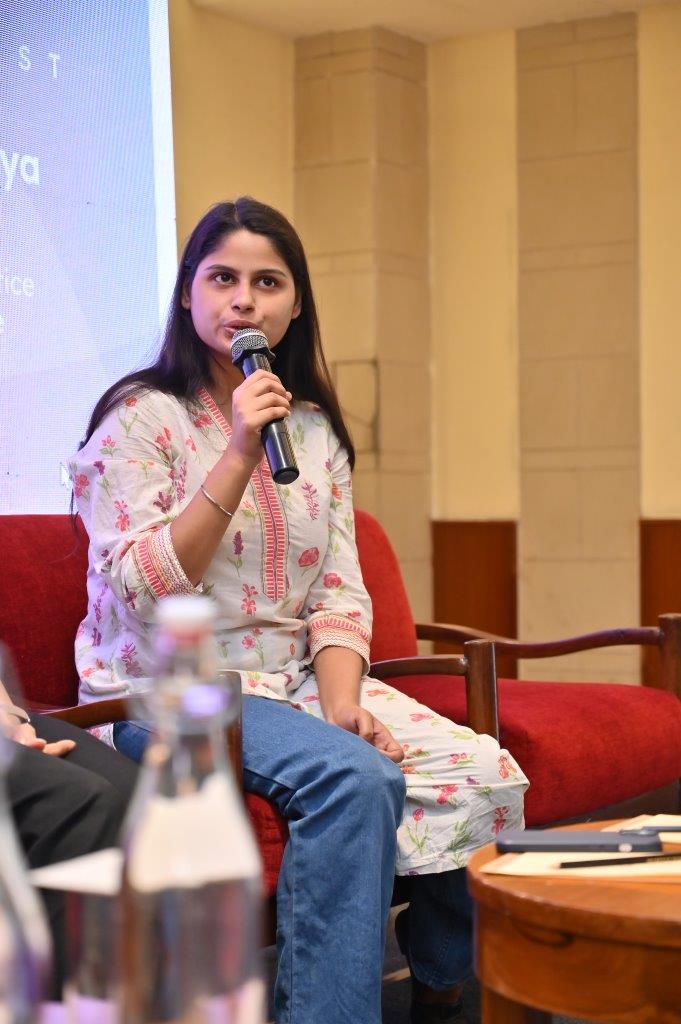
She stressed the need to create spaces and platforms where youth can lead. “Youth must be recognized not only as volunteers but as leaders of tomorrow,” she said, advocating for mentorship programs that encourage autonomy and creativity.
Key Takeaways:
Youth are key stakeholders in the climate movement, bringing energy, tech-savviness, and local insights.
Women mentors can support with empathy, guidance, and access to networks, amplifying youth-led climate innovation.
Intergenerational collaboration is essential for sustainable impact.
Panel Discussion 2: Forests That Breathe – Growing Habitats, Not Just Trees
Speakers:
- Padma Shri Jadav Payeng
- Mr. Hem Kumar Pande (IAS Retd.)
- Dr. Sulagna Chattopadhyay
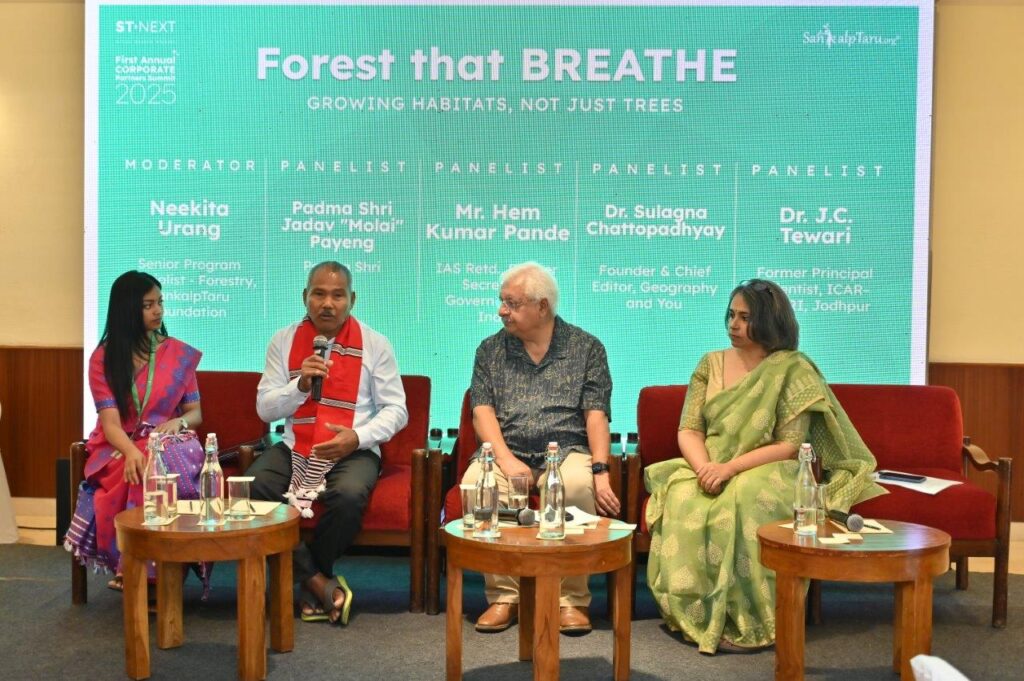
Panel Reflections: The second panel tackled the essence of ecological restoration through expert insights. This thought-provoking panel brought together renowned environmental leaders to explore the deeper meaning of afforestation, ecosystem restoration, and climate resilience. Speakers reflected on personal journeys, institutional challenges, and the ecological transformations taking place across India.
- Padma Shri Jadav Payeng – Key Discussion Points
Mr. Payeng emphasized that a plantation becomes a forest only when it supports not just plant life, but also allows native fauna—birds, mammals, insects—to settle, breed, and thrive. He shared that his Molai Forest transitioned from a plantation to a living forest the moment animals began returning and natural regeneration took over. “Nature responds when you allow it to breathe. When birds build nests and elephants take shelter, you know you’ve created a home, not just a grove.”
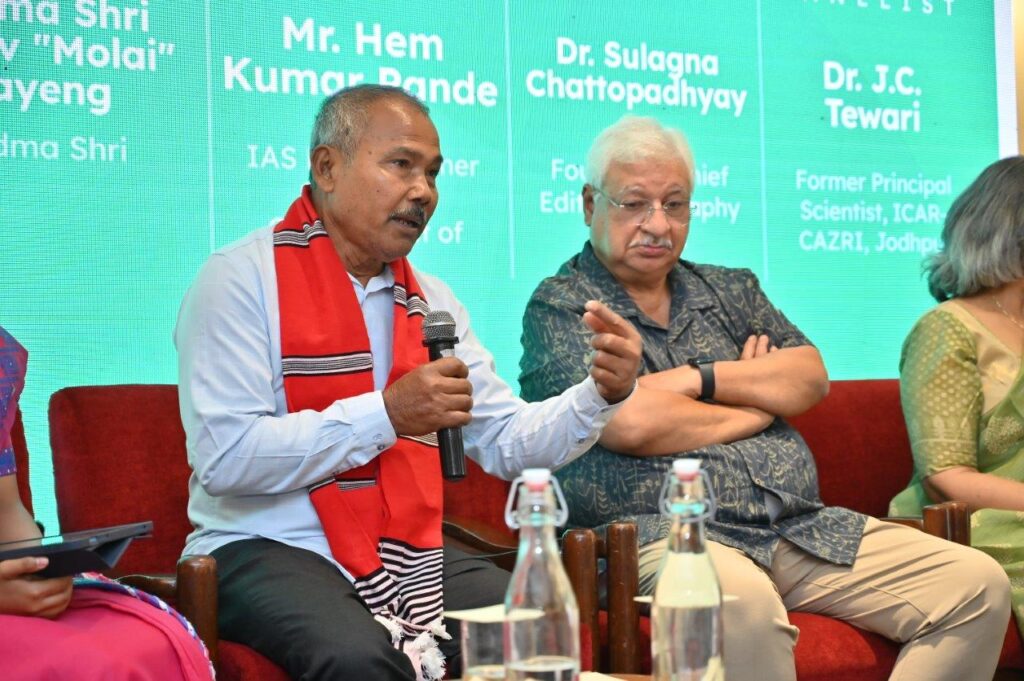
Key Takeaway: True success in afforestation is measured not by the number of trees planted, but by the self-sustaining biodiversity that emerges over time. Soil health, natural water cycles, and coexistence of flora and fauna are essential indicators.
- Mr. Hem Kumar Pandey, IAS (Retd.) – Key Discussion Points
Mr. Pandey offered a nuanced critique of high-density afforestation models like Miyawaki. While beneficial in urban settings, he cautioned against using them as a universal solution. In rural and natural landscapes, these models can stress ecosystems and lead to poor survival rates. He advocated for a context-sensitive approach grounded in local biodiversity and ecological needs. He urged a shift from “numbers-driven” campaigns to quality-based ecological restoration—using native species, involving local communities, and ensuring long-term care.
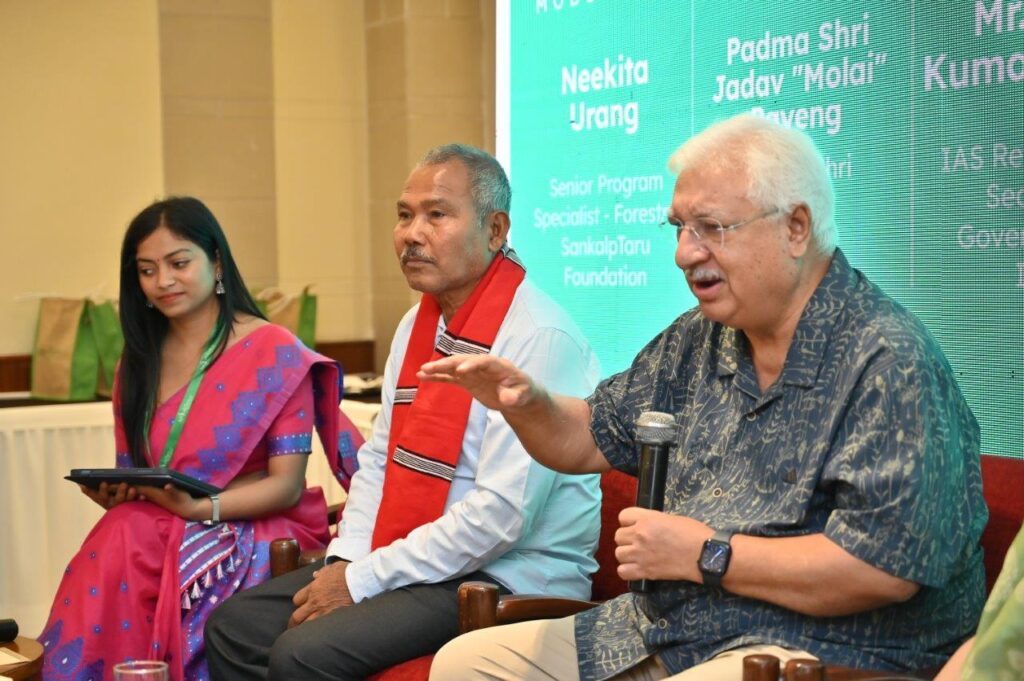
On research-practice gaps: Despite India’s advanced institutions (e.g., FRI, CSIR, ICAR), much of the scientific output remains locked in academic silos. Systemic barriers like lack of inter-agency coordination, limited grassroots engagement, and insufficient field-testing of models were identified. Bridging this gap requires stronger institutional frameworks, policy-level support, and inclusive models that involve civil society, NGOs, and local governance in applying research to the ground.
Dr. Sulagna Chattopadhyay – Key Discussion Points
Dr. Chattopadhyay highlighted how permafrost thaw is not just a geological concern but a biological one. As soils destabilize, microbial activity increases, carbon release accelerates, and habitat structures collapse. This affects forest regeneration and long-term habitat stability. Species are being forced to migrate upward or adapt to changing snow and temperature conditions. However, not all species are adaptable—this leads to fragmentation, reduced gene flow, and extinction risks.
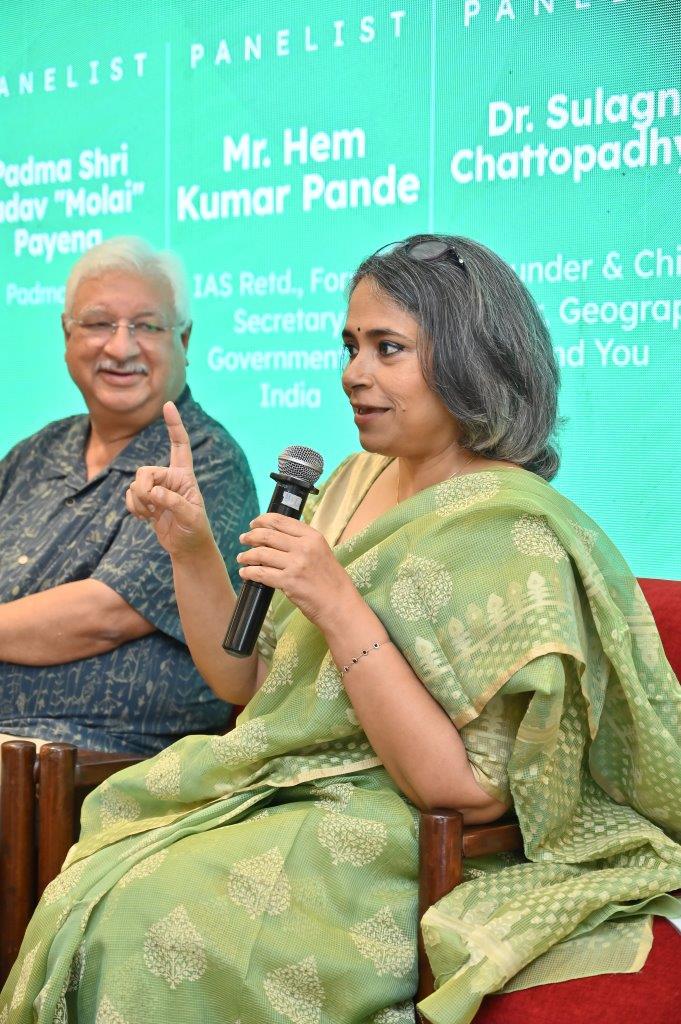
Call to Action: Focus on restoring “ecological intelligence” within the soil—by protecting native seed banks, preserving microbial diversity, and allowing forests to regenerate with minimal human interference.
Key Takeaway: Conservation must move beyond protection to rebuilding dynamic habitats. Efforts should be climate-aware, region-specific, and proactive in responding to ecological signals.
From Dialogue to Direction: Summary of Deliberations
From Plantation to Ecosystem: Forests are more than trees—they are networks of life that must be nurtured holistically. Plantation of native species should be enforced strictly.
Education Rooted in Experience: The panel reinforced the need for integrating environmental literacy from the primary school level, enabling children to engage directly with nature.
Collaboration and Action: Lasting ecological impact requires coordinated action between communities, scientists, and policymakers. The role of traditional knowledge, long-term stewardship, and citizen participation emerged as critical.
Founder’s Keynote: A Vision for the Future
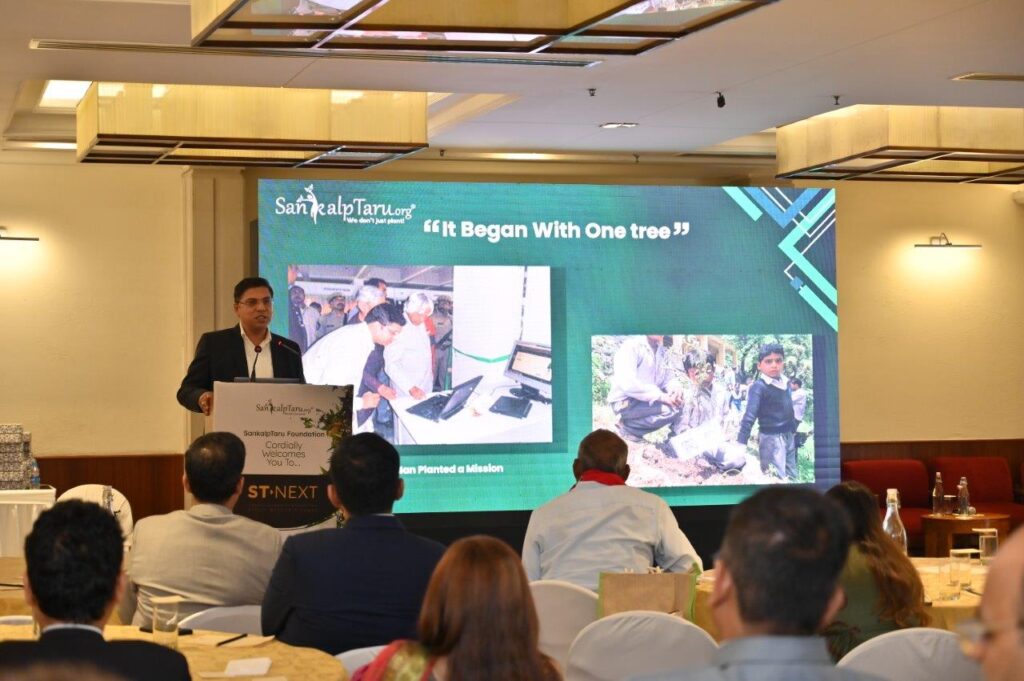
Speaker: Apurva Bhandari
Keynote Summary:
Apurva Bhandari, Founder of SankalpTaru, took the stage to reflect on the organization’s journey—from planting a single tree to transforming lives and landscapes across India.
Emphasizing tech-enabled, people-centric solutions, Mr. Bhandari unveiled upcoming SankalpTaru Foundation’s transformative initiatives aimed at scaling green impact across rural and urban ecosystems. He focused on the transformational role of innovation, partnerships, and community empowerment.
He positioned SankalpTaru not merely as a plantation organization, but as a dynamic climate innovation ecosystem. In a tone both visionary and grounded, he set the stage for a new era of environmental action.
Champion of Trees Beyond Pledges: Felicitating Corporate Changemakers
The Felicitation Ceremony, “Champion of Trees Beyond Pledges“ celebrated and recognized the corporate partners whose unwavering commitment and strategic collaborations have significantly contributed to advancing sustainability goals, community resilience, and climate action. Each partner was acknowledged and felicitated with a memento presented by Padma Shri Jadav Payeng and Apurva Bhandari not only for their financial support but also for their innovative models of engagement, employee involvement, and on-ground impact.
These efforts span from transforming barren lands into forests to using technology for ecological restoration, all while empowering local communities. Together, these partners and SankalpTaru are proving that corporate responsibility can lead the way in combating climate change and fostering inclusive green growth.
A Collective Call: Carrying the Momentum Forward
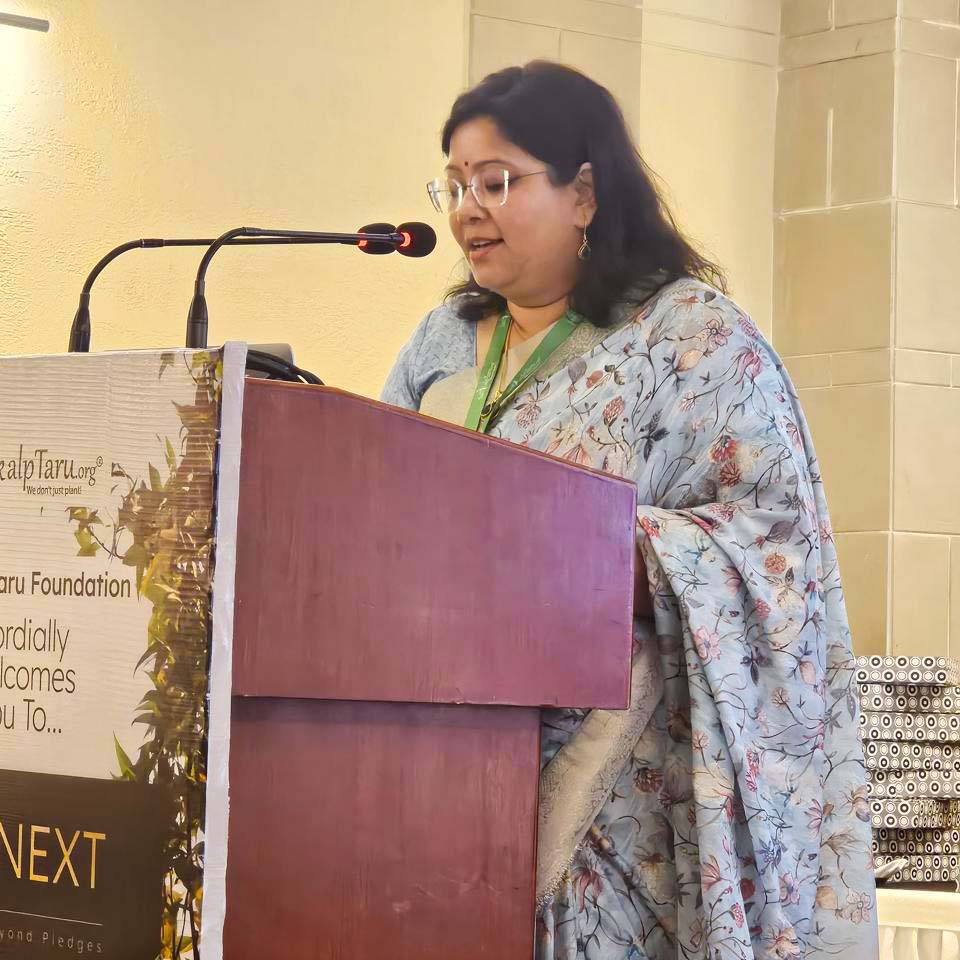
The summit closed with a powerful message from Priyanka Negi Bhandari, Chief Operating Officer, SankalpTaru Foundation.
“This wasn’t just a conference,” she said, “It was a convergence of purpose. The stories shared today are blueprints for change. Let’s carry this momentum into every space we occupy—as individuals, institutions, and communities.”
Mrs. Priyanka acknowledged the rich diversity of voices—from grassroots women farmers to corporate leaders and youth climate champions—and emphasized how each speaker contributed a vital piece to the collective vision of a more sustainable and inclusive future.
She highlighted the urgency to turn ideas into action and called on everyone present—partners, participants, and stakeholders—to continue this journey beyond the event. Her message was one of shared ownership and long-term commitment.
The closing note was followed by high tea, during which participants explored the exhibit area of SankalpTaru’s Innovation Hub. They engaged closely with interactive displays, cutting-edge technology demonstrations, and informative panels that showcased the foundation’s pioneering approaches to environmental sustainability. The space offered a comprehensive insight into SankalpTaru’s innovative projects, highlighting how technology, community involvement, and ecological restoration come together to drive impactful climate solutions.
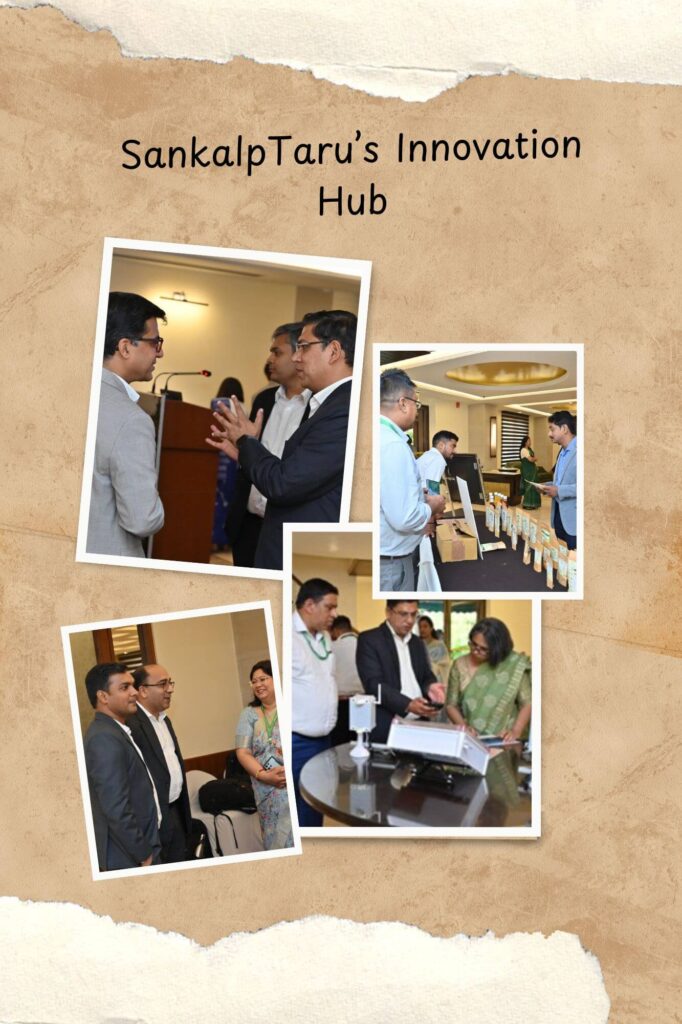
Final Reflection: Action Beyond Pledges
ST_Next 2025 was not a ceremonial gathering—it was a declaration of where we go next. It challenged corporate partners and stakeholders alike to move beyond tokenism, to cultivate living ecosystems, to invest meaningfully in people and places, and to embed climate action into every business decision, brand strategy, and corporate behavior.
As SankalpTaru looks toward the future, one truth remains clear: the path to sustainability lies not just in the number of trees we plant, but in how deeply we grow our roots—into communities, consciousness, and coexistence. Corporate leadership and commitment will be pivotal in scaling this impact and driving systemic change.

